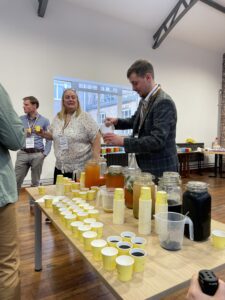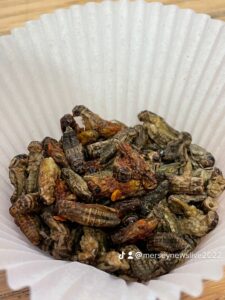Crickets and bee juice were on the menu today at an event hosted by LJMU Business School, when small sustainable food companies shared their produce and expertise.
The group Prime (Principles for Responsible Management Education) held a Local Network event for local businesses.

The first session was held by Sam and Joel whose business is Bee Hive Juice Bar.
The company promotes a healthy lifestyle, by producing 15 different type of juices. Today, they brought in four of their own. The first one was called the Flu Fighter. This contained oranges, carrots, ginger and turmeric, and they explained how these ingredients helps combat flu.
Other drinks including Minty Apple; Flush – which cleanses the liver, and contains celery, lemon and ginger – and Charcoal lemonade. The Bee Hive Juice bar shared fascinating facts, such as bees won’t go near a place with a high volume of wifi.
Wendy Johnston, a lecturer from Sport and Exercises sciences, then introduced her project: snacks made from crickets.
Ms Johnston said that as the population increases we have more mouths to feed: “We need energy, and we need to change our consumption patterns”.
She explained that every 100g of crickets contain 60g of protein.

Our MerseyNewsLive reporters tried the crickets and, perhaps surprisingly, judged them to be delicious. Wendy Johnston had this final comment to say: “Our population will continue and there will be more mouths to feed, it can’t be tomorrows problem – we need to change our ways of thinking, today.”
Several bottomless bee juices and packets of crickets later, we made our way downstairs to the lettuce wall.
Wendy Johnston introduced the Farm Urban wall, which had several lettuces growing. She explained how this help reduce food waste as every time you eat or cut the leaves off, the lettuces will continue to regrow as it’s constantly in water and soil.
We then met Si Poole. Si grows his own mint leaves in his garden and gave us a taste session of different types of mint leaves. There were several pots of tea, from pineapple to mojito.
Thank you to @PRMESecretariat for having us @JMUJournalism students today. It’s been incredible. Here’s a few images #PRMENorthWest #Sustainability #jmujournalism #student #ljmu #10yearanniversary #CottonExchange #UNPRME pic.twitter.com/lPZsJUHy9N
— Annabelle (@annabelleljmu20) November 29, 2022
Since the 1950s, there has been a loss of common garden vegetables due to seed manufacturing, including mint plants. Currently, there are only 12 Tania mint plants on the planet, and they are critically endangered. Around the world, there are over 187 different flavoured mint plants.
The message from the event was: Support your local business!
Here are links to more information on two of the companies involved:
- https://theguideliverpool.com/the-beehive-juice-bar-gets-set-to-relaunch-on-smithdown-road/
- https://www.inyourarea.co.uk/news/chester-lecturers-mint-collection-internationally-recognised/

Featured image: PRME













